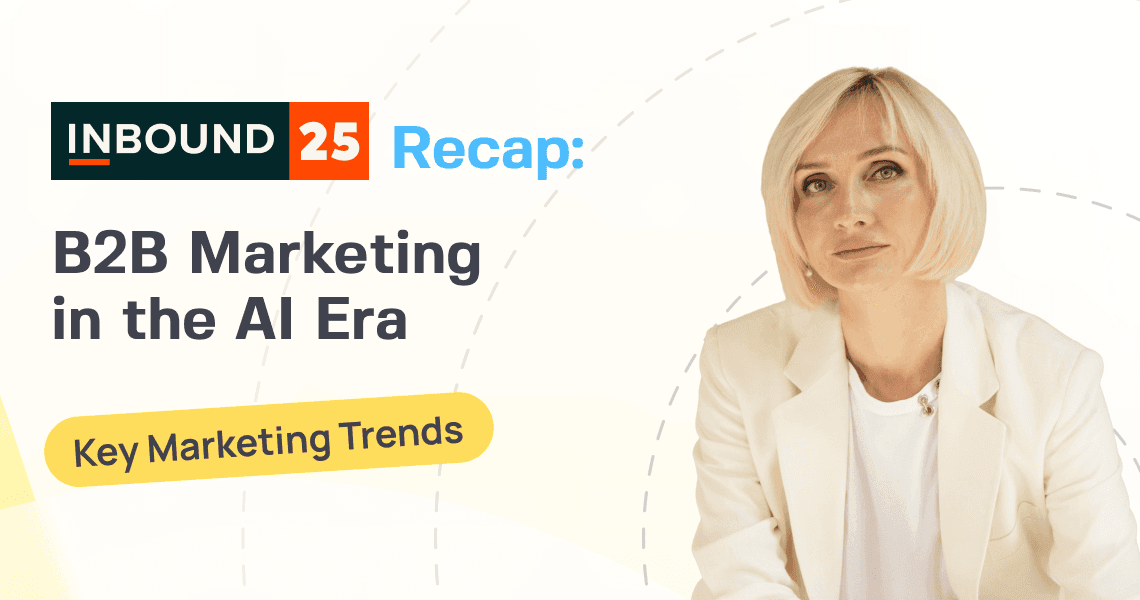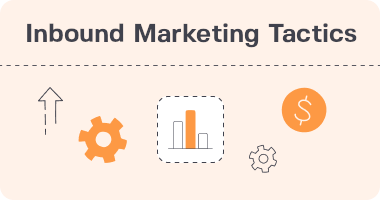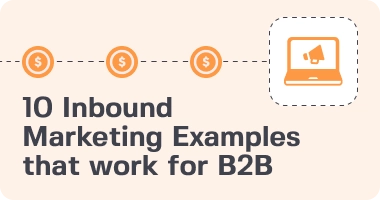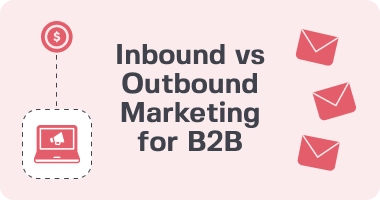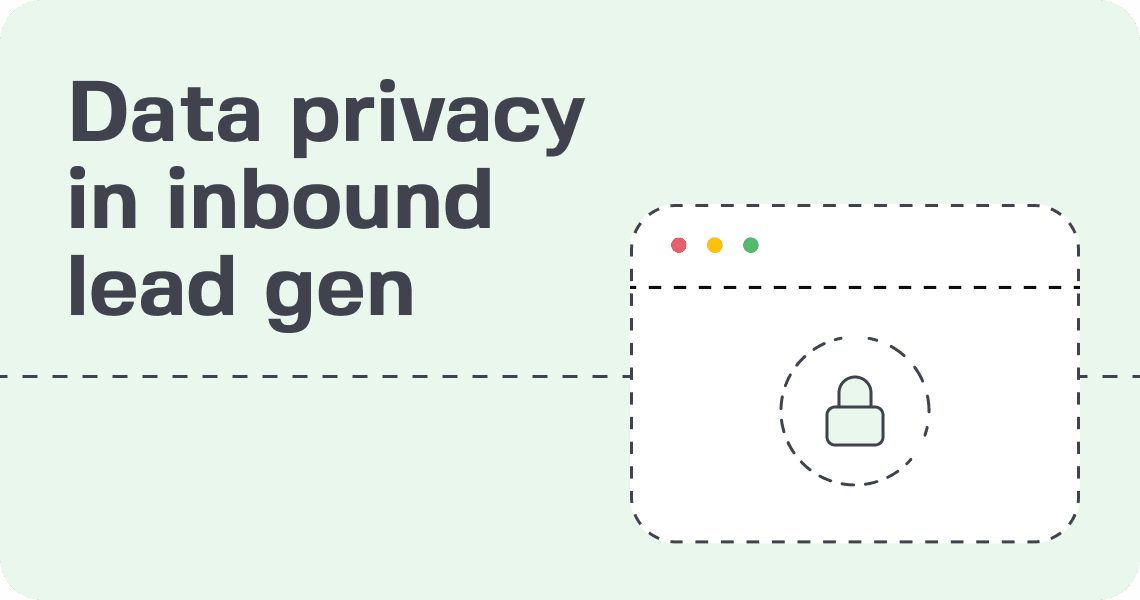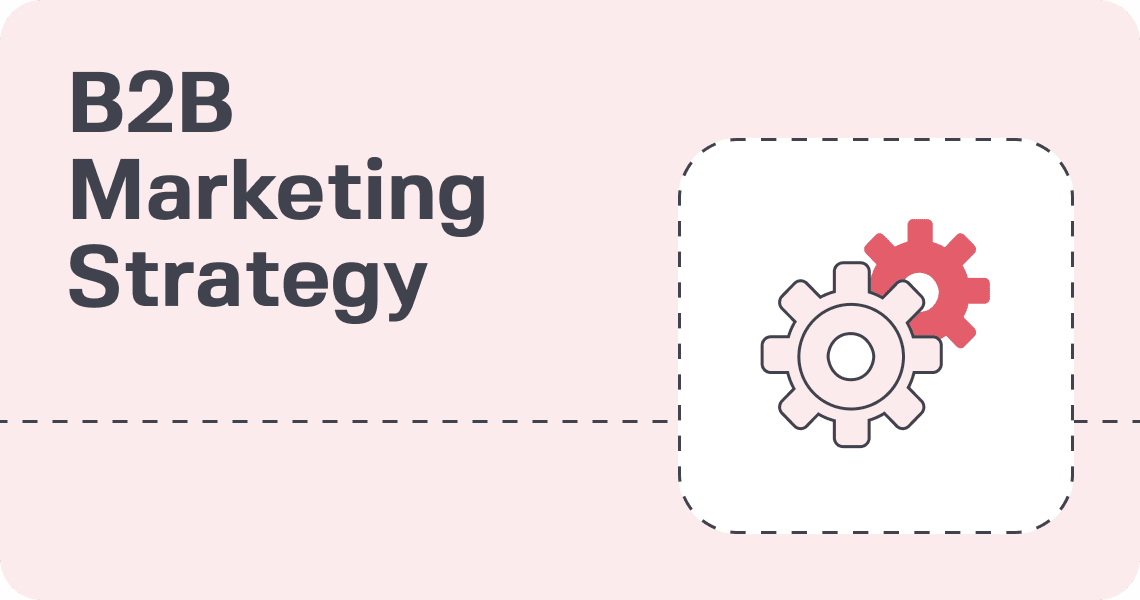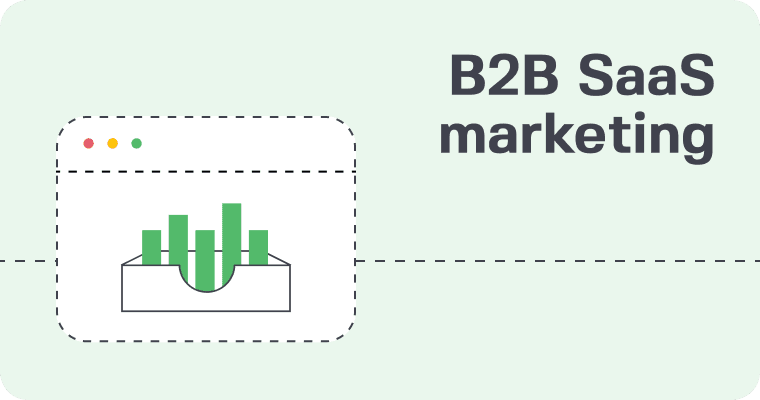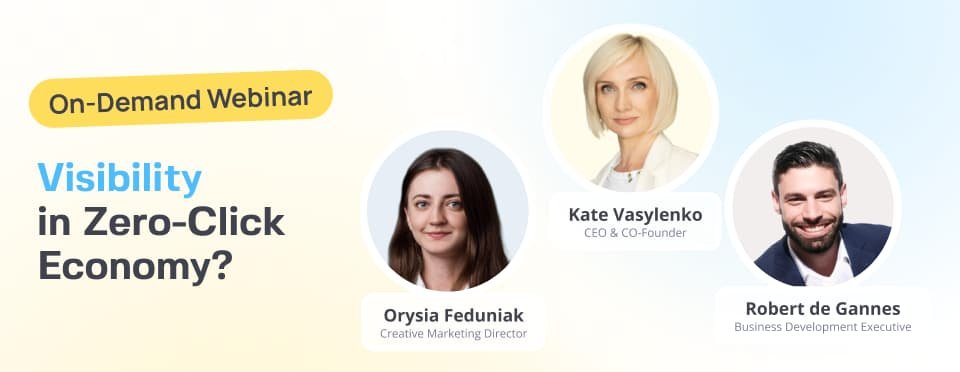INBOUND is one of the biggest events in the marketing world, and this year was no different. It’s where we, as marketers, get the latest on what’s shaping the future of B2B tech marketing—and we’re here to share what stood out.
Our CEO, Kate Vasylenko, attended INBOUND 2024 and brought back insights that we think will shape how B2B companies approach marketing in the months ahead. Here’s a breakdown of the most impactful updates, especially around AI, content, and omnichannel strategies.
TLDV: Key trends & insights from INBOUND 2024
Here’s what you need to know:
- 🤖 GenAI is here to stay: HubSpot’s big focus this year was GenAI, with new tools like Breeze making AI more accessible for marketers. Whether you’re just getting started or already integrating AI, it’s clear that AI-first CRMs are becoming the new standard.
- 💯 Authenticity matters: As AI-generated content floods the market, genuine stories and real-life experiences will stand out. Prioritizing authenticity will help build trust and differentiate your brand.
- 🌐 Omnichannel strategy is crucial: B2B targeting is evolving beyond LinkedIn.Embrace social media and other platforms to create a cohesive customer experience across all touchpoints.
- 🛠️ New tools to explore: INBOUND 2024 introduced some interesting new tools, including RollWorks for contact-based advertising and MNTN for connected TV targeting. These innovations are opening up new ways for B2B companies to reach their audience.
- 🎤 Celebrity insights: Serena Williams and Ryan Reynolds inspired us with their journeys and advice, reminding us that passion is key to success.
Let’s dive deeper into these insights and see how they can shape our B2B strategies moving forward!
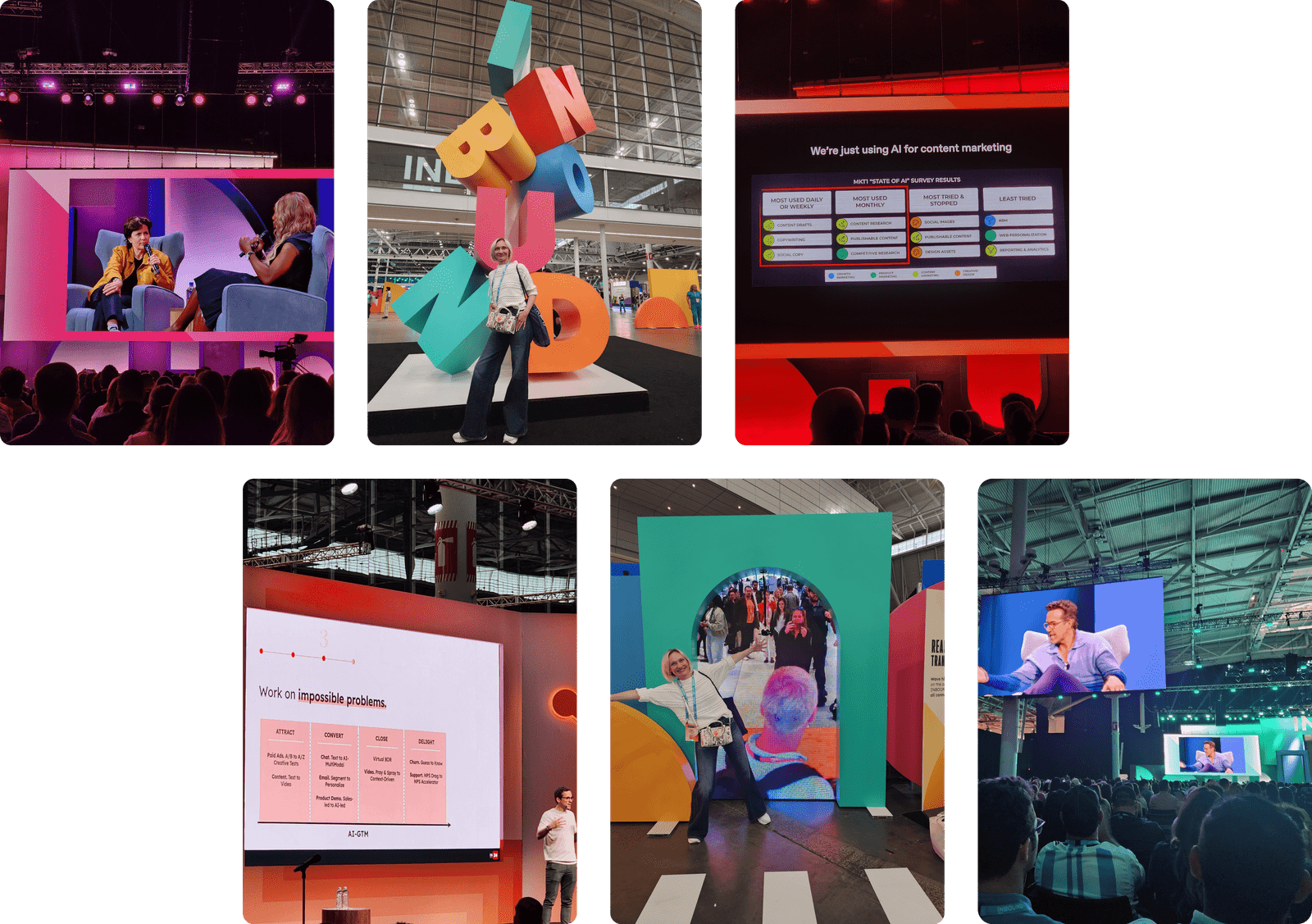
GenAI reshapes Hubspot: New standard in marketing
In 2024, HubSpot went all in on GenAI, introducing new capabilities from Breeze Intelligence to the HubSpot Content Hub. This strategic shift aims to simplify the adoption of GenAI in marketing and sales at an unprecedented scale, enabling users to benefit from AI technologies without needing to master prompt engineering. This democratization of AI is crucial because it opens the door for all businesses, regardless of their tech-savviness. By lowering the barriers to entry, HubSpot is making it easier for companies to integrate AI into their workflows, which can lead to improved efficiency and productivity.
As HubSpot’s CEO, Yamini Rangan, noted in one of her interviews, there will be only one type of CRM moving forward—an AI-first CRM.
This is a pivotal moment for B2B companies to recognize that the landscape is changing FAST. Just as color TVs replaced black-and-white ones, businesses that cling to outdated systems will be left behind.
The implication here is clear: adopting an AI-first approach isn’t just an option; it’s becoming a necessity for survival in the competitive B2B market.
HubSpot’s strategy focuses on embedding AI directly into their products to minimize cognitive friction for users. This means that teams can be more efficient without needing deep technical skills to navigate complex AI systems.
For B2B companies, this presents a significant opportunity to streamline processes, improve customer interactions, and ultimately drive better results. Imagine a sales team that can leverage AI tools to analyze customer data in real-time, leading to more personalized outreach and improved conversion rates.
That is HubSpot’s vision that Yamini shared in a podcast and reiterated at INBOUND 2024:
“When you have a customer platform that is connected, you create happy customers. Our vision is to unify engagement hubs, a smart CRM, and an ecosystem of partners to make sure that every customer interaction is smooth, efficient, and personalized.”
This statement highlights the importance of integration in today’s digital landscape.

For B2B marketers, this means creating a seamless experience for clients, where every touchpoint feels cohesive and tailored to their needs.
Yamini’s focus on customer happiness underscores a fundamental truth: businesses thrive when they prioritize their customers’ experiences. This isn’t merely about data integration; it’s about enabling businesses to craft meaningful interactions across marketing, sales, and support. B2B companies should take note—this holistic approach can lead to stronger relationships, higher customer satisfaction, and ultimately, increased loyalty.
AI was already a major player, but HubSpot’s new Breeze Intelligence made it clear: AI is no longer just a buzzword. The updates show how AI can simplify processes like content creation, lead scoring, and customer segmentation. It’s not about being a tech expert—HubSpot’s AI tools are now accessible to teams without deep technical skills, which means smarter workflows and more time to focus on strategy.
💡 Why it matters: AI is here to stay, and if you’re not using it to make your marketing more efficient, you might be missing out. The easier it is to adopt, the faster your team can get up to speed.
Now let’s talk about the content and what people’ve been talking about.
HubSpot’s major updates deep dive: Simplifying AI for everyday use
Hubspot team presented massive update this year, announced by CEO Yamini Rangan on the Day 1. It is almost 100% connected to AI-fication of the Hubspot products.
Let’s dig into what really stood out: the launch of HubSpot’s AI called Breeze.
HubSpot rolled out massive updates this year, all designed around AI-fication of their tools. At the center of these updates was Breeze, a suite of AI tools that automate everything from content creation to customer support. The platform now includes Breeze intelligence, Copilot and AI agents for content management, social media scheduling, prospecting, and customer interactions.
For Content Marketers, the most significant upgrade was to the Content Hub. Now, you can not only create content from scratch but also remix and repurpose existing content across multiple channels. Say you’ve created a video—now, with just a few clicks, you can turn it into clips, articles, or audio pieces that are optimized for each platform. This kind of omnichannel content strategy is exactly what B2B companies need to stay relevant across the myriad touchpoints their customers use.
When, last year, everyone was just talking about GenAI and ChatGPT, this year, it felt like everyone was showing it—embedded in their products in every use case, for better or for worse. HubSpot’s approach makes it even easier for users: there’s no need for complex prompt engineering in the Content Hub. You simply ask what you want, and the system does the rest.
Building brand authenticity: Authenticity, real stories and experiences
The second big takeaway was the importance of authenticity and the power of real-life stories. Yes, AI can scale your efforts. Yes, it can make your processes faster. But can it replace the human touch? Not really.
As more companies turn to AI for content creation, a crucial question arises: how can we find authentic stories in a sea of generic content? This concern highlights why the social media boom in B2B is only just beginning; there’s a growing demand for genuine stories and real-life experiences that resonate with audiences.
One of my favorite speeches was on how to tell a great story by being a guide, not a guru. You do it by building trust among your community. | 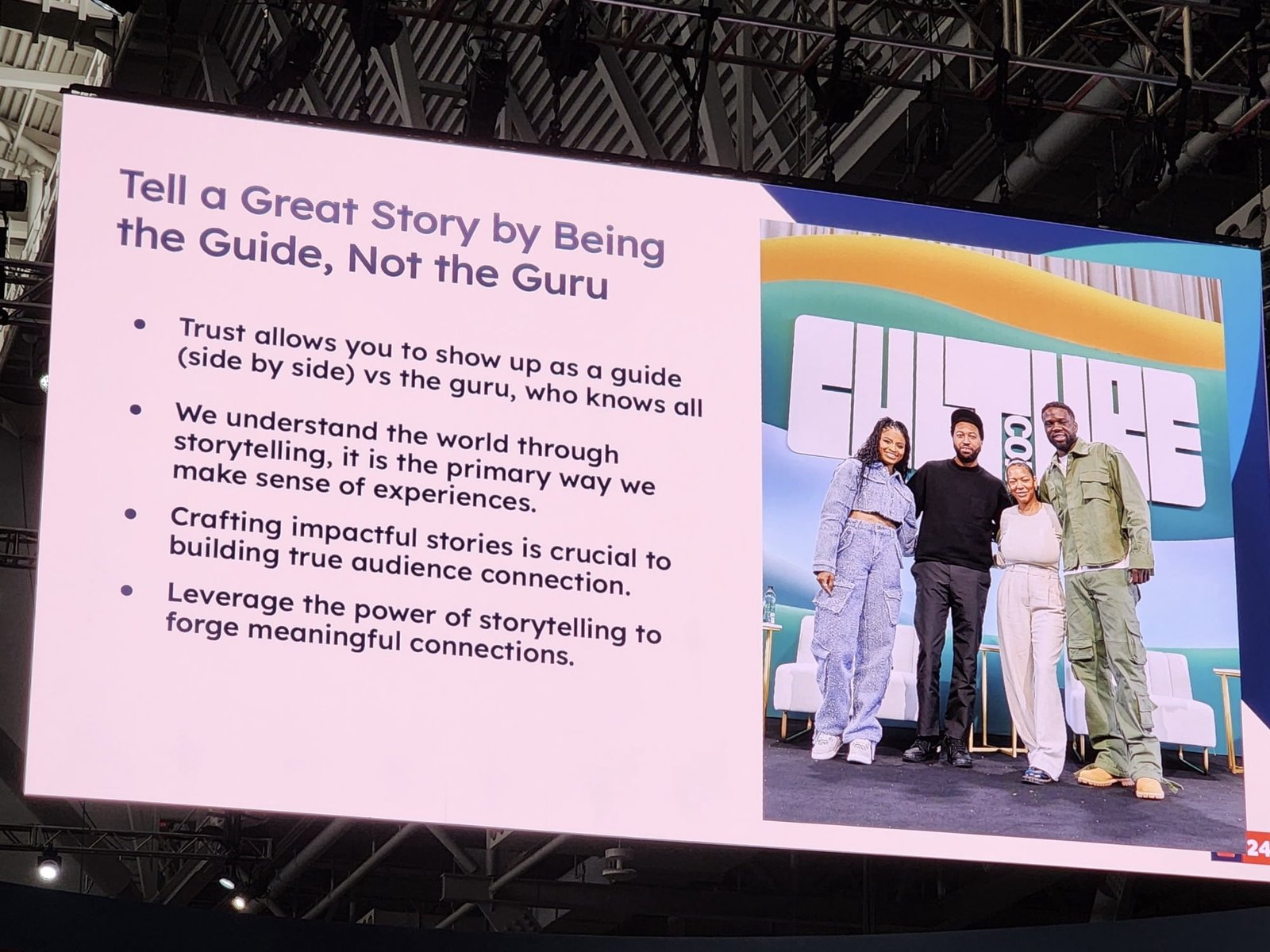 |
The idea that any story should have a drunk party test for the brand, because if your brand doesn’t work when drunk it doesn’t work at all. It is a great way to test your positioning or any elevator pitch 🙂 | 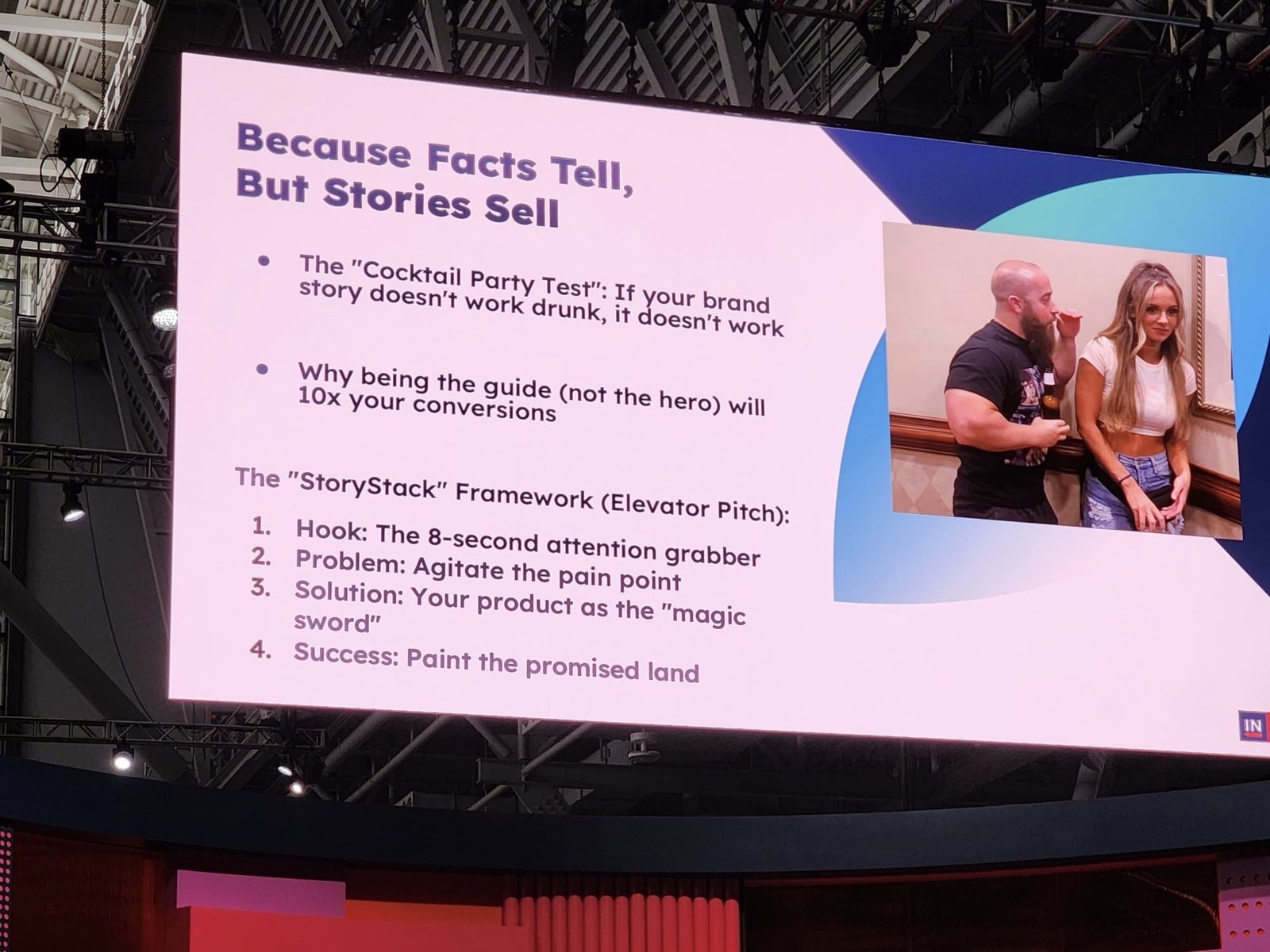 |
And that was pretty controversial to the role of AI as content generator that was shared during the presentation of the content hub. | 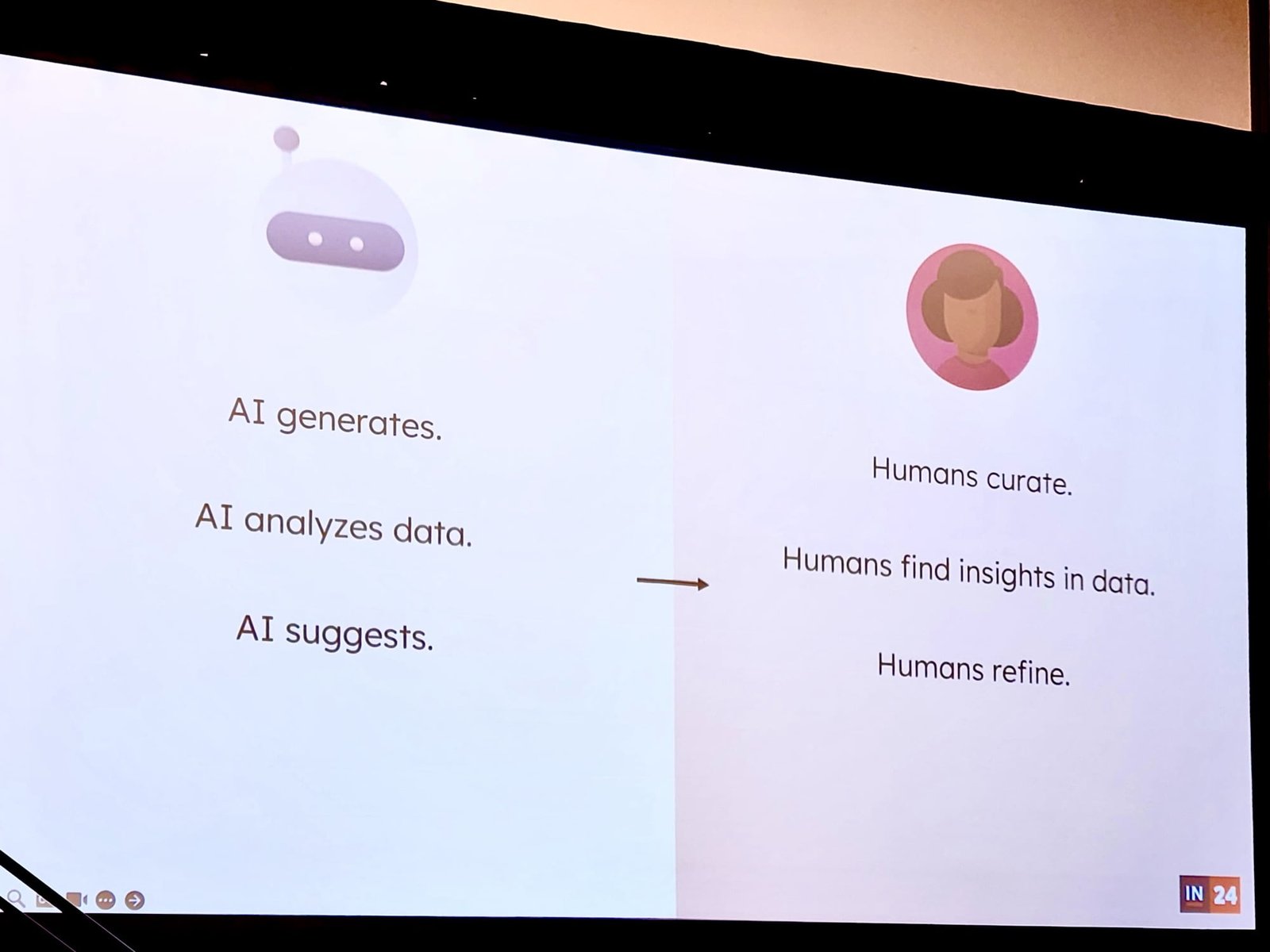 |
Marketers have pointed out that HubSpot’s AI, while powerful, can be a bit difficult to control. It’s not about typing a perfect prompt but about guiding the AI in the right direction. For B2B companies, this means there may still be a learning curve when it comes to getting the AI to do precisely what you want.
I believe in a more balanced approach to collaboration:
- AI researches the topic and the data, and generates insights.
- Humans decide which insights to pursue and craft unique ideas that resonate with the audience, ideally, providing real-life examples and success stories to support these ideas.
Once you have a solid foundation, the AI can create the content and adapt it for various formats and channels. This way, a single idea can evolve into a comprehensive campaign rooted in insight and a holistic vision.
But maybe I’m missing something, and I need to give HubSpot’s Content Hub a try to see its potential firsthand. We’re looking forward to gathering data next week and will share our feedback as soon as possible.
Implication for B2B Marketers: As the landscape becomes saturated with AI-generated content, B2B marketers must prioritize authenticity. This means sharing unique insights and experiences that reflect true expertise. Emphasizing personal stories and genuine interactions will not only differentiate your brand but also foster trust with your audience.
The trend is clear: people are seeking connections with brands that feel real and relatable. Leveraging social media platforms to share these authentic narratives will help establish a strong community around your brand, positioning you as a thought leader in your industry.
In a world where everyone and their chatbot is churning out content, standing out isn’t easy. But that’s where the real stories – your stories – come in. At 42DM, we’re doubling down on helping our clients share what makes them unique. It’s not about shouting louder; it’s about saying something worth listening to.
Omnichannel B2B marketing: Expanding beyond LinkedIn
The potential of social media in the B2B space was another major theme at INBOUND 2024. Neil Patel’s presentation emphasized that the B2B social media boom is just beginning. As businesses explore these platforms, the demand for authentic, relatable content will grow. For marketers, this means moving beyond traditional methods and embracing new formats and channels. Engaging customers through social media can create vibrant communities that amplify brand messages and encourage user-generated content. Сompanies increasingly turn to social media for engagement, and the demand for authentic, real-life expertise will only grow.
And Neil Patel suggested a framework of efficient execution of omnichannel content strategy:
Test the idea with the community on TW 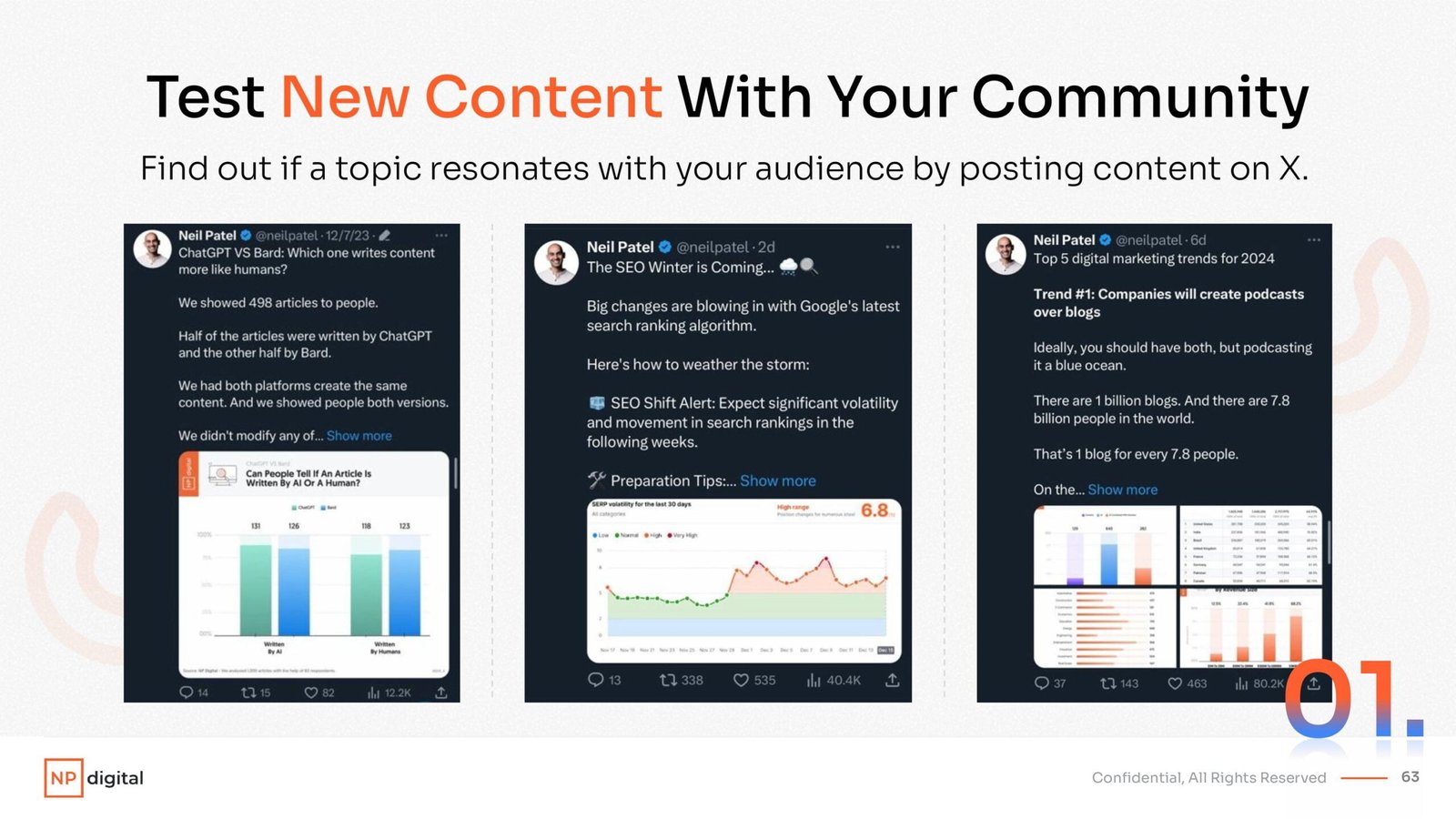 | Expand your reach with short form content video 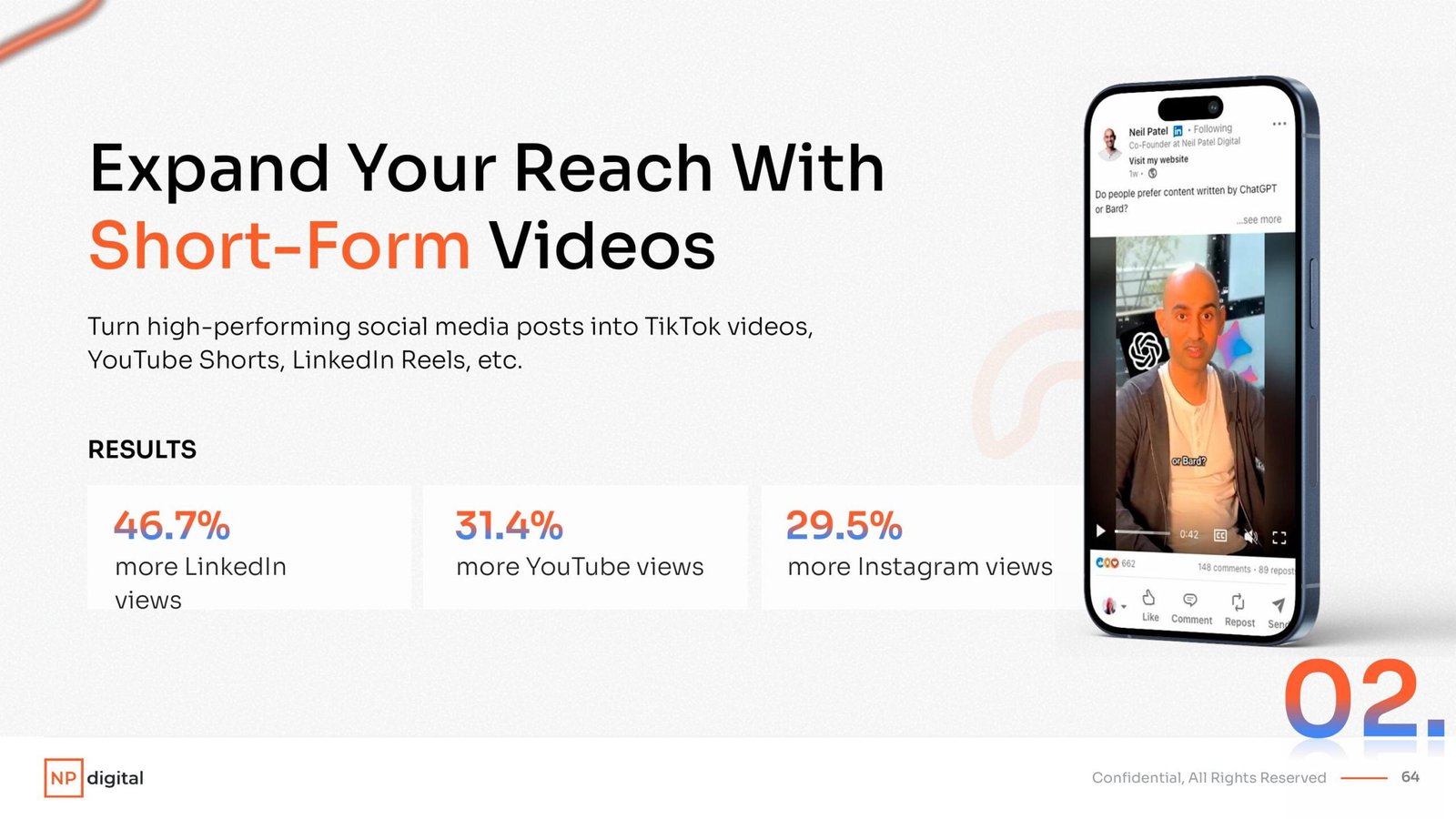 |
Create long form content based on the insights 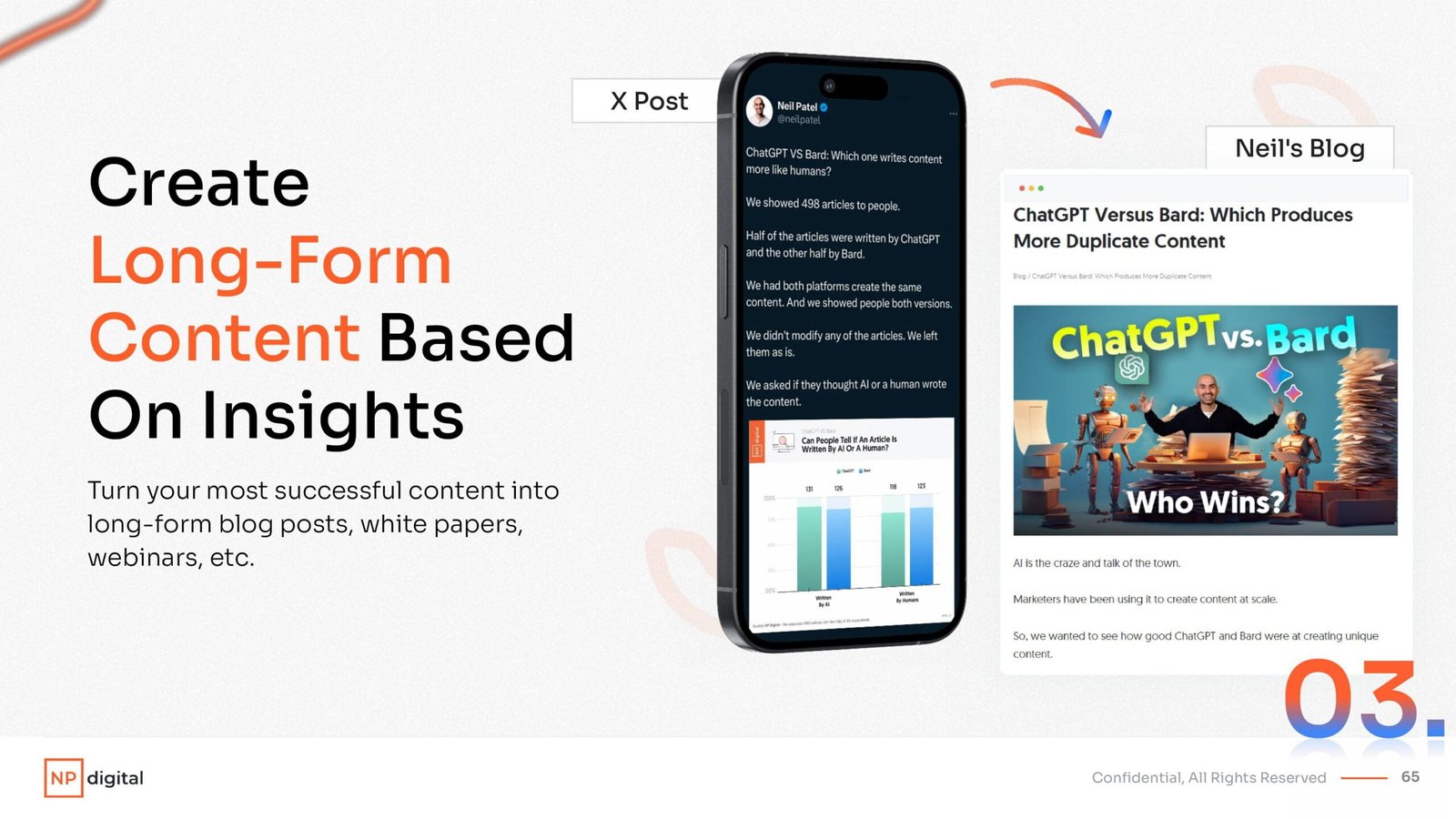 | Turn winning blog posts into Lead Magnets & Webinars 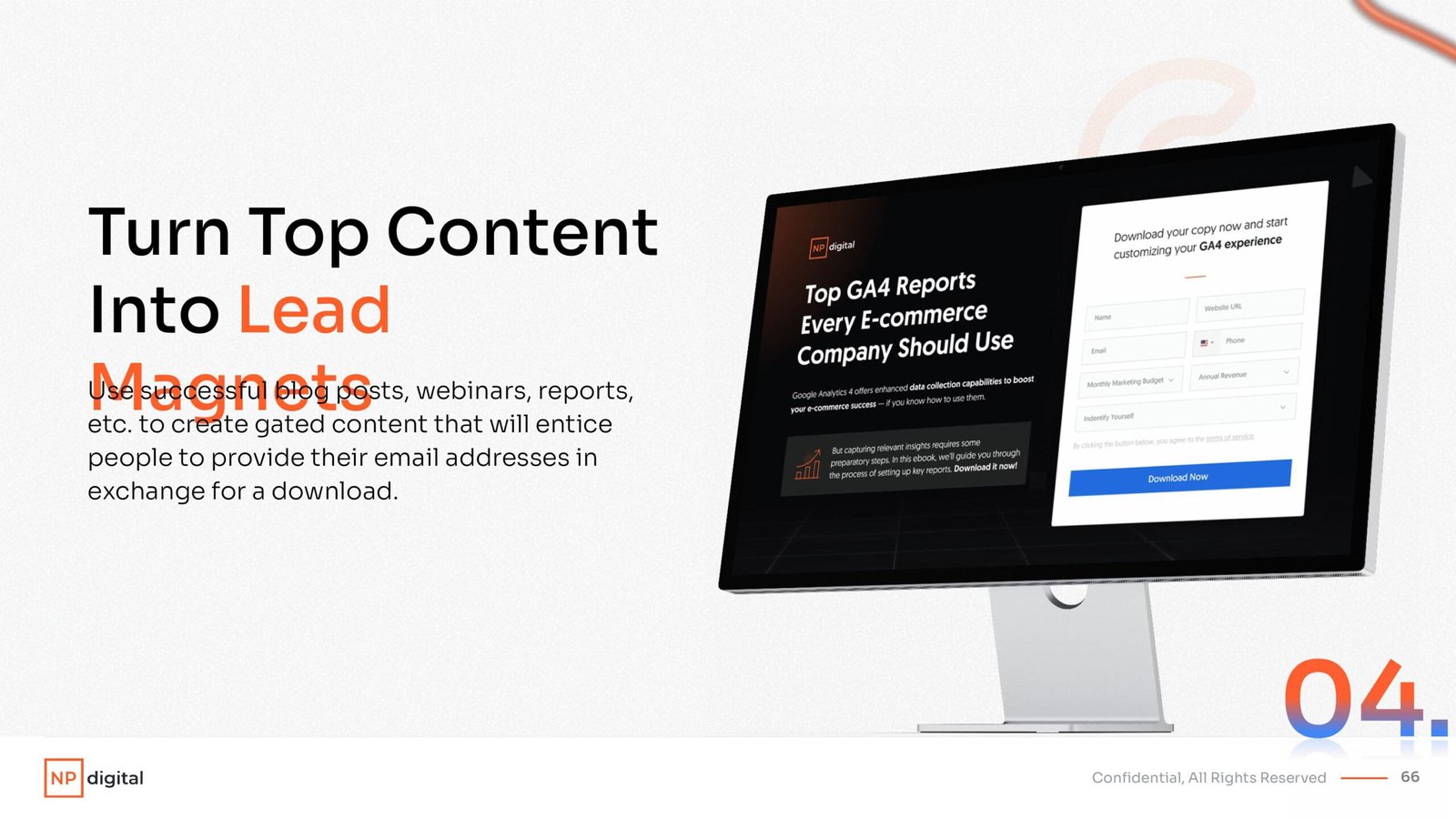 |
And you don’t need to make your videos fancy, the performance doesn’t corelate with the quality or budget spent on the video. And the social media that provides you the greatest organic reach are not the once you could expect 🙂
LinkedIn’s great, but it’s not the only place B2B decisions are made. We’ve been nudging our clients to branch out for a while, and INBOUND 2024 just confirmed we’re on the right track. B2B buyers are people too, and they’re all over the internet. Our job is to help you meet them where they are, in ways that feel natural and valuable.
What’s new in B2B marketing tools: ABM and CTV platforms
ABM contact based advertising. RollWorks, a division of NextRoll made headlines with their expansion into contact-based advertising, making their #ABM platform even more precise. A big thanks to Ian Ingar Brown for the engaging chat on this topic!
Connected TV for B2B. Beyond touring for the Deadpool, Ryan Reynolds is getting into B2B adtech platform with Mountain.com (MNTN), a demand-side platform that enhances B2B targeting on connected TVs. The impact of connected TV can’t be underestimated but for B2B brands it was hard to include it into the marketing mix, because of broad targeting & weak attributtion, now with Mountain it could be worth a try. I had a great conversation with Clayton Schader about testing Mountain and would love to share our results after the pilot.
Linkedin campaign optimization tool. Did you know that 10% of your accounts are getting 80% of the budget spent on average campaign on Linkedin? That issue is promised to be solved with the AdPilot by Factors.ai, which helps optimize LinkedIn ad spending across targeted accounts. I enjoyed my chat with Srikrishna Swaminathan isna Swaminathan, and hope to test their solution with our clients soon.
But beyond these three, we have a lineup of great tools to test post-conference, like Goldcast for podcasts and content recycling, Search Atlas for SEO and link building, and D-ID for digital avatars.
Celebrity sessions & Inspiration
Of course, the celebrity sessions were unforgettable! Serena Williams shared her unique journey into investing back in the early 2000s, discussing how her $111 million fund is helping young entrepreneurs make a difference.
And then there was Ryan Reynolds, the one and only Deadpool himself—and also the perfect madman of the 21st century, who provided a fascinating look at his growth in the advertising world. |  |
With the best insight of the day about how to become good in anything you are passionate about: “Passion isn’t just about loving something. It’s about being willing to suck at it until you don’t.” | |
INBOUND 2024 experience: When marketing is an experience, not just a service
And let’s not forget to give kudos to the entire HubSpot team for their hard work on the INBOUND 2024 conference. The event was an amazing experience, featuring incredible interior design and numerous photo zones. HubSpot knows that today’s top B2B marketing professionals expect more than just updates and data.
The event itself was a lesson in how experiences matter in today’s B2B landscape. From the design of the conference space to the small details like photo zones—everything reflected how well HubSpot understands the need for interactive, visually engaging environments.
Take the “Hello from the other side” photo zone, for example. It was a simple yet genius idea that connected people from different zones visually, turning it into a place where attendees could spot each other and snap memorable shots. |  |
These moments create emotional connections, making the event not just an exchange of ideas but an experience people remember.
Everyone had the chance to get a professional Breeze photo for their profile, and I couldn’t resist getting two myself! |  |
It was a fun, interactive touch that showed just how much thought went into making every attendee feel special and engaged.
Additionally, HubSpot branding was everywhere, transforming any spot into a perfect photo opportunity. This attention to detail created an inviting atmosphere that encouraged attendees to connect and engage. |  |
In the same way, B2B marketers should think about how they’re creating experiences for their customers. Are you offering more than just a product or service? Are you giving your customers a reason to engage with you that goes beyond the transaction?
Wrapping it all up: What B2B Marketers should do next
INBOUND 2024 wasn’t just a conference; it was a roadmap for the future of B2B marketing. As we look ahead, the key takeaways are clear:
- Embrace GenAI: AI isn’t something to fear—it’s something to embrace. Use AI to enhance what you’re already doing, ensuring you maintain the authenticity and personal touch that your customers value.
- Prioritize Authenticity: In a market saturated with AI-generated content, authenticity becomes a key differentiator. Share unique insights and experiences that reflect your true expertise. Authentic, personal stories will foster trust and set your brand apart.
- Adopt an Omnichannel strategy: The need for an omnichannel presence is more crucial than ever. Your customers interact with multiple touchpoints across various platforms. Ensuring a consistent and seamless experience across all these channels will keep your brand relevant and accessible. From content creation to customer engagement, think about how you can distribute and tailor your message across different mediums to reach your audience effectively.
Implication for B2B Marketers: Embrace AI to handle repetitive tasks, prioritize authenticity in your messaging, and adopt an omnichannel approach to meet your customers where they are. By integrating these three strategies, you can create meaningful connections and stay ahead in the competitive B2B landscape.
As the event showed, marketing is no longer just about offering a service—it’s about creating an experience. From embracing GenAI to fostering authenticity and adopting an omnichannel strategy, it’s all about making meaningful connections. Let AI handle the repetitive tasks, but don’t forget: the human touch is still the most powerful tool you have.
We’re excited to put these ideas to work. If you’re curious about how any of this could apply to your business, let’s chat. We’re always up for a good conversation about making B2B tech marketing more effective (and maybe even a bit more fun).
Inbound 2025 goes west: See you in San Francisco
As always, INBOUND 2024 was an unforgettable experience, filled with incredible insights, conversations, and connections.
But the most amazing thing about the INBOUND conference is the opportunity to connect with incredible marketers, creators, and developers. It’s the people—the vibrant HubSpot community—that make this event truly unforgettable, and this year was no exception. I already miss everyone and can’t wait to see everyone again very soon.
And here’s the most exciting news of all: HubSpot is hitting the road! Next year, the event will be held in San Francisco in 2025. I’m already counting down the days until we can reunite on the West Coast for another amazing year of innovation and inspiration.
See you there!


